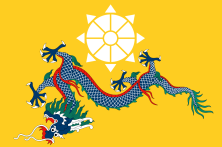Century of Humiliation
“”The opening of
|
| — |
The century of humiliation was a period in ![]() Chinese history beginning with the First Opium War (1839–1842,
Chinese history beginning with the First Opium War (1839–1842, ![]() Qing Dynasty), and ending in 1945 with
Qing Dynasty), and ending in 1945 with ![]() China emerging out of the Second World War as one of the Big Four. During this period of roughly a hundred years, China was is typified by decline, defeat and political fragmentation. Foreign, mainly
China emerging out of the Second World War as one of the Big Four. During this period of roughly a hundred years, China was is typified by decline, defeat and political fragmentation. Foreign, mainly ![]() European powers like
European powers like ![]() Britain and
Britain and ![]() Russia exploited China for goods and clay. They intervened, annexed and subjugated China. In the century of humiliation, China is seen as a weak and crumbling empire.
Russia exploited China for goods and clay. They intervened, annexed and subjugated China. In the century of humiliation, China is seen as a weak and crumbling empire.
History
Chinese ![]() nationalists in the 1920s and the 1930s dated the Century of Humiliation to the mid-19th century, on the eve of the
nationalists in the 1920s and the 1930s dated the Century of Humiliation to the mid-19th century, on the eve of the ![]() First Opium War amidst the dramatic political unraveling of
First Opium War amidst the dramatic political unraveling of ![]() Qing China that followed.
Qing China that followed.
Defeats by foreign powers cited as part of the Century of Humiliation include the following:
 Western and Japanese Trade in Opium to China (1800s–1940s)
Western and Japanese Trade in Opium to China (1800s–1940s) Defeat in the First Opium War (1839–1842)
Defeat in the First Opium War (1839–1842) British occupation of Hong Kong (1841-1997)
British occupation of Hong Kong (1841-1997) Treaty of Nanking (1842)
Treaty of Nanking (1842) Treaty of Whampoa (1844)
Treaty of Whampoa (1844) Defeat in the Second Opium War (1856–1860)
Defeat in the Second Opium War (1856–1860) Treaty of Aigun (1858)
Treaty of Aigun (1858) Treaty of Peking (1860)
Treaty of Peking (1860) The sacking and looting of the Old Summer Palace by Anglo-French forces (1860)
The sacking and looting of the Old Summer Palace by Anglo-French forces (1860) Partial defeat during the Sino-French War (1884–1885)
Partial defeat during the Sino-French War (1884–1885) Treaty of Shimonoseki (1895)
Treaty of Shimonoseki (1895)
Collapse of Qing Dynasty
![]() ROC defeated Qing Dynasty during the Xinhai Rebellion to abolish
ROC defeated Qing Dynasty during the Xinhai Rebellion to abolish ![]() monarchy and kicked out the
monarchy and kicked out the ![]() Manchus.
Manchus.
How to draw

Century of Humiliation has a drawing rating of hard.
- Draw a ball.
- Fill it with yellow.
- Draw an upside down blue Chinese dragon with red and green hair and white scales in the middle. It’s head should be facing left.
- Add the imperialism symbol on top of the dragon.
- Add Chinese eyes and you are done!
| Color Name | HEX | |
|---|---|---|
| Yellow | #FECD21 | |
| Blue | #00386A | |
| Green | #09866C | |
| Red | #E6170F | |
| White | #FFFFFF | |
| Black | #000000 | |




